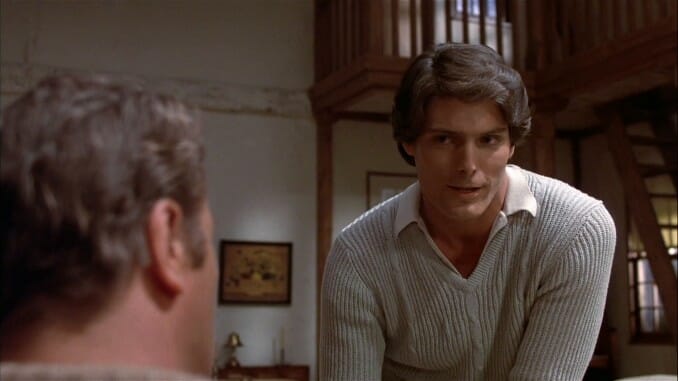At the start of 1982, Christopher Reeve had only four film credits to his name: A minor role in naval adventure Grey Lady Down, the romantic lead in cult classic Somewhere in Time and—of course—star of two Superman movies. Landing such an iconic part so early made Reeve alert to the risks of typecasting, and he would spend the rest of his career trying to prove to the world he had much more of a range than the uncomplicatedly good superhero. Taking the role of Clifford Anderson in Deathtrap would shock people. That’s what he wanted.
When we first meet him, however, Clifford is just Clark Kent without the glasses. A sweet and bumbling novice playwright, he’s mailed a script to famous scribe Sidney Bruhl (Michael Caine), who’s invited Clifford to his home and offered to help him with it.
In reality though, Sidney is struggling. He’s not had a hit for years, and is tired of relying on the largesse of his rich, sickly wife Myra (Dyan Cannon). Receiving the script in the mail inspires an idea: Kill Clifford and claim the play as his own. The play—which is, by the way, entitled Deathtrap—is a sure-fire hit that would set him up for life. What’s a little murder when presented an opportunity like that? Though she’s not thrilled at the prospect, Myra begrudgingly takes a seat and watches her husband begin his murderous plan.
A brief PSA. If you have never seen Deathtrap, and you’d like to do so without discovering the biggest of the movie’s many twists, now’s your opportunity. Spoilers are coming in 3…2…1…
It works. Sidney kills Clifford, then he and Myra bury the body. Other than an unnerving visit from Helga Ten Dorp (Irene Worth), the psychic next door, everything goes off without a hitch. Still, the couple is edgy. After trying to prove to his anxious wife the next evening that the noises she hears outside are nothing, the two head back to bed. Sidney asks Myra to open the window…
…and who should burst through—at the film’s precise midpoint, no less—but Clifford. Myra immediately has a heart attack and dies. It’s revealed that Clifford and Sidney are lovers who’ve been plotting to scare the fragile Myra to death and get their hands on her enormous fortune. At first it seems like they’ve gotten away with their nefarious scheme, but there’s a growing level of distrust between the two men and almost an hour of movie left. Plenty of time for more surprises.
Based on the successful stage play by Ira Levin and directed by five-time Oscar nominee Sidney Lumet, Deathtrap certainly doesn’t lack for prestige. Yet through all the twists and turns, the meta comments (it frequently stops just short of having a character wink at the camera) and the delicious repartee, the film is an unashamedly unpretentious good time. This is a stage adaptation that doesn’t try to hide its origins—it both starts and ends in a theatre—but rather than deadening the action, as is often the case with similar adaptations, it enlivens it. As the cast prowls the set, we’re encouraged to imagine ourselves in a sold-out audience on opening night, feeling the breathless excitement of having no idea what’s coming next.
Caine had already excelled within this theatrical territory a decade earlier in Sleuth, a similarly twisty two-hander co-starring Laurence Olivier. That the films have a huge amount in common—Caine, limited sets, a raft of immaculately-hewn insults, fiendishly smart plotting—is remarked upon in almost every review of Deathtrap, and they were bound even closer in the cultural imagination when both were cited as influences on Rian Johnson’s murder-mystery megahit, Knives Out.
Caine’s performance in Deathtrap is extremely entertaining, yet Sidney doesn’t change much over the course of the action. His motivations shift (or our perception of them does), but he retains his core personality throughout: He’s sly, manipulative and often unknowingly out of his depth.
Reeve, on the other hand, gets to play everything (including a brief but hilarious take on Caine’s legendary Cockney brogue). There’s a special joy in watching him throw off his early, familiar Clark Kent innocence to become someone audiences hadn’t ever seen him as before. Contemporaneously, the most dramatic example of this was the kiss between Reeve and Caine that reveals the true nature of their relationship; despite being barely more than a peck, it became known as “the $10 million kiss” for the amount it’s estimated to have lost the movie at the box office (though it remains unclear exactly how that figure was calculated).
Today it seems like far less of a big deal; just one of many sides to Reeve’s kaleidoscopic character, who keeps shifting before our eyes from seductive to menacing, sweet to sociopathic. In a couple of instances, his various personas are stripped away and we see straight through to his inner core of roiling fury; the movie-star handsome planes of his face contorting into something almost demonic. Reeve attacks every one of Clifford’s numerous facets with the indomitable energy of someone exhilarated to be finally showing the world what they can do.
The tragically few remaining years of Reeve’s career boasted a few other non-Superman highlights. In addition to well-regarded period dramas (The Bostonians, The Remains of the Day), Noises Off—another stage adaptation co-starring Caine—was a great showcase of his underrated gift for physical comedy. And his knack for villainy would enliven otherwise underwhelming features like Bump in the Night.
Yet while Reeve frequently had the opportunity to demonstrate different sides of his dramatic arsenal, there was never another individual film that displayed the full force of his range quite as well as Deathtrap. Forty years later, his performance is still thrilling to watch—the most exciting part of a movie that refuses to stop surprising.
Chloe Walker is a writer based in the UK. You can read her work at Culturefly, the BFI, Podcast Review, and Paste.
